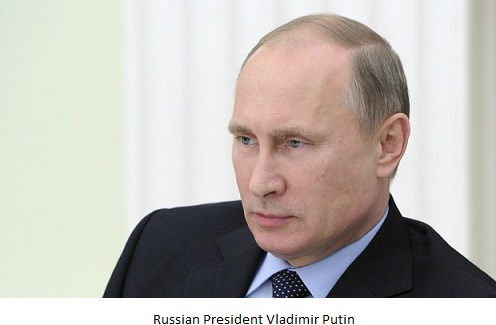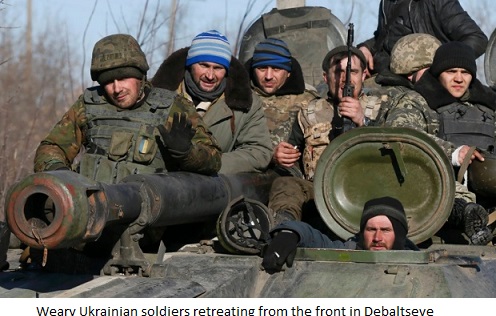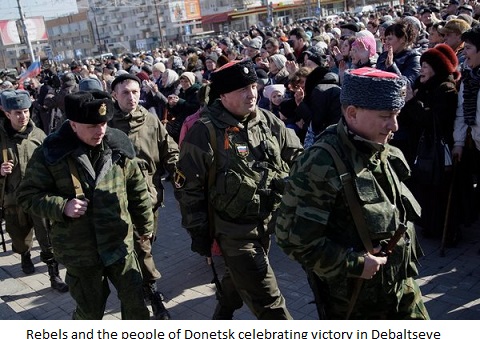CSMS Magazine
If there was any doubt about the strength of the Ukrainian separatists and about their ability to push the Ukrainian army out of the Donbass region, once the industrial heartland of Ukraine, their recent and sweeping victories in virtually every front have unequivocally erased all confusion on this matter. In the aftermath of their spectacular seizure of the strategic town of Debaltseve back on February 23rd, the world has come to fully understand that in proxy politics, firepower backed by popular support is a determinant factor in predicting the outcome. In this case, firepower supplied by Mother Russia and the genuine fear of ethnic and linguistic cleansing have pushed the inhabitants of Donetsk and Lunhansk deep into rebel’s camp. Now that the guns have been reportedly to be relatively silent, the Donbass, once the breadbasket of Ukraine, has never been so far from Kiev’s radar screen.
Debaltseve, a strategic transportation hub linking Donetsk to Lunhansk was vital to either side, even more so to the separatist movement, for controlling the town would give their self-proclaimed republic an easier route to conduct free trade among the two battle-hardened regions. The Ukrainian army needed to maintain a foothold in the town if it wanted to inject hopes in western Ukraine and be empowered at the negotiating table in Minsk. So sensitive was the issue, Debaltseve was left practically untouched, unresolved during the negotiations in the Belorussian capital.
German Chancellor Angela Merkel and her counterpart French President François Hollande along with Ukrainian President Petro Poroshenko were betting on an unspoken, two-pronged strategy: Securing a ceasefire through the signing of a peace agreement which would have frozen all belligerents into place but also would have left the Ukrainian army firmly in control of Debaltseve. Should that plan work, they would have urgently moved to deploy European monitors, thereby consolidating Poroshenko’s gain.
Rewriting the narrative
 Vladimir Putin and his allies had their own game plan. They remained tightlipped on the touchy issue of Debaltseve because they knew they held the strategic high ground. In mid-January, when the separatists overpowered the army in and around the Donetsk Airport and moved west, they had been on a roll, capturing a string of towns and villages as they advanced westward to the very front door of Debaltseve, ready for a major showdown. Soon, the strategic hub became the most important battleground, the ultimate prize to win.
Vladimir Putin and his allies had their own game plan. They remained tightlipped on the touchy issue of Debaltseve because they knew they held the strategic high ground. In mid-January, when the separatists overpowered the army in and around the Donetsk Airport and moved west, they had been on a roll, capturing a string of towns and villages as they advanced westward to the very front door of Debaltseve, ready for a major showdown. Soon, the strategic hub became the most important battleground, the ultimate prize to win.
New York Times reporter, Andrew E. Kramer, reporting from Artemivst, a town of about 50 miles west of Debaltseve, which had become the new army headquarters, conceded that the fall of Debaltseve was a complete rout. He went on to say that “it was unclear how many of the thousands of Ukrainian soldiers trapped in the eastern Ukrainian town had survived the hellish retreat under enemy fire and avoided capture.” But Petro Poroshenko had his own figure—80 percent had made it out alive. That figure, however, was highly disputed in the Western Press because the Ukrainian generals usually do not speak in public about their troops’ strength.
Trying to put his best face forward in the wake of one of his army’s biggest military defeat, Poroshenko went on national TV to announce that he had ordered a strategic withdrawal as a show of goodwill in line with the Minsk agreement signed on February 12th. The true was the Ukrainian government had long been secretly preparing for the evacuation of the town. Facing a rebel onslaught on all sides, the army leadership had resorted to “moving trucks and ambulances through farmers’ fields” in the wee hours in the morning to avoid capture by the separatist fighters who brazenly brushed aside the ceasefire accord to launch a ferocious assault that began shortly after the signing of the agreement.
According to the Times, there was no mercy for the retreating army, which came under a relentless assault shortly after the evacuation was underway. A Ukrainian soldier, who made it out alive, described the scene as hell on earth. “Bullets came raining down on us from all directions.” The night was cold and dreary as soldiers wrecked by spook and dread were given only ten minutes to pack up and head for the valley of death. They knew they were surrounded for being pinned down by relentless artillery bombardments, but they were simply betting on life, hoping that the angels of salvation would spare them, allowing them to live to fight another day.
 The sky looked dull and bleak. Few little stars twinkled in the firmament. Vehicles’ headlights were flicked off to ensure safe passage through the enemy line. Like a church procession, they held their breath and their hymns as they threaded down snow covered farmlands while being shielded by lines of tanks and tracked vehicles on both sides. Unbeknown to them was that they had been lured into an obvious deadfall, a bloody subterfuge.
The sky looked dull and bleak. Few little stars twinkled in the firmament. Vehicles’ headlights were flicked off to ensure safe passage through the enemy line. Like a church procession, they held their breath and their hymns as they threaded down snow covered farmlands while being shielded by lines of tanks and tracked vehicles on both sides. Unbeknown to them was that they had been lured into an obvious deadfall, a bloody subterfuge.
Albert Sardaryen, a 22-year old paramedic, who witnessed the carnage, told The New York Times that as soon as the first soldiers began to trickle out of town, they were greeted by heavy fire coming from all sides. Fallen comrades cried in vain for a miraculous rescue, for the survivors had to keep on walking, leaving their lifeless fellow soldiers and the dying behind in blood-soaked snowy country roads because they were too many to carry along.
Mark Galleotti, a professor of global affairs at New York University and a Russia expert, stated that knowing the Moscow support for the rebels in both logistic and advanced weaponry, “the question was when, not if it (Debaltseve) fell…..It is just too important a communication hub for Donetsk and Lunhansk, and a weakness in the rebel defensive line for Moscow and the rebel leaderships to pass up.”
Rebel leader: triumphant as ever
Aleksandr Zakharchenko, the leader of the self-proclaimed Donetsk People’s Republic, made it clear that his aim was to rid Donetsk and Lunhansk from the range of army gunners that had been indiscriminately killing men, women and children or anyone who had fallen into their sight while venturing down the streets of central Donetsk City. Zakharchenko himself was wounded while leading his troops in the battle for Debaltseve. NPR international correspondent based in Moscow, Corey Flintoff, who reported from the city, said everyone in town was in perfect agreement with the latest drive to push the Ukrainian army west, away from urban centers, including those who openly pledged their allegiance to Kiev at the start of the war a year ago.
After almost a year of fighting, more than 5,000 people were reported to have died and over one million internally displaced, victims of the savagery of a war that began last April after a Western backed putsch overthrew pro-Russian President Viktor Yanukovych and—at gunpoint—installed a putschist government Russophobe and openly hostile to Russian speakers in the eastern-half of the country, triggering the bloodiest conflict in the heart of Europe since the Balkan war in the mid-1990s.
Ukraine is a practically crippled country governed by corrupt oligarchs, including the president himself Mr. Poroshenko, a self-made billionaire who used his personal fortune at several moments during the war to make political points. The prime example was when he threatened to fire his employees at his candy factories in Mariupol, his hometown, if they did not march toward the city hall to take it back from separatists who had been occupying it, as it were the case for all the major towns in the Donbass.
There is a consensus in the corridors of policymakers in Washington that Russia may have its way once more at staving off a NATO expansion in Ukraine, the birthplace of Mother Russia. As Ukraine is now being dismembered and its eastern provinces are firmly into rebel hands, there is hope that the war might truly be ending and the government in Kiev can finally focus its attention toward reviving a chattered economy, rampant unemployment and massive corruptions within the state bureaucracy. The question is now whether folding Crimea into Russia’s map and carving the Donbass away from Kiev’s orbit will be enough for Vladimir Putin who seems unforgiving with regards to the putsch leaders in Kiev and their western allies.
Also see: Western coup in Ukraine
Note: Dr. Ardain Isma is Chief-Editor of CSMS Magazine. He is a novelist. His latest work of fiction, titled Midnight at Noon, is a critically acclaimed and powerful novel that describes horrific tales of raw exploitation in Haiti and what can be done to rescue Haiti from the brink. To order a copy, click here: Midnight at Noon. Dr. Isma is also a scholar who teaches Cross-Cultural Studies at UNF. He can be reached atpublisher@csmsmagazine.org Also, like us on Facebook: www.facebook.com/csmsmagazine



The problem with western interventions in power countries such as Ukraine is that they do it with a complete disregard to human intelligence. They knew in supporting the coup against an elected government allied to Russia that the consequences could be fatal.